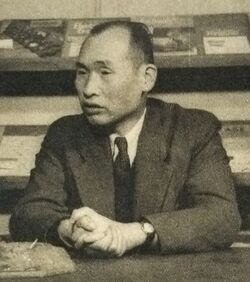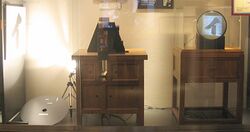Biography:Kenjiro Takayanagi
Kenjirō Takayanagi | |
|---|---|
高柳 健次郎 | |
 Kenjirō Takayanagi in 1953 | |
| Born | January 20, 1899 Hamamatsu, Shizuoka Japan |
| Died | July 23, 1990 (aged 91) Yokosuka, Kanagawa, Japan |
| Nationality | Japanese |
| Engineering career | |
| Discipline | Electrical engineering |
| Significant advance | Development of television |
Kenjiro Takayanagi (高柳 健次郎 Takayanagi Kenjirō, January 20, 1899 in Hamamatsu, Shizuoka – July 23, 1990 in Yokosuka) was a Japanese engineer and a pioneer in the development of television.[1] Although he failed to gain much recognition in the West, he built the world's first all-electronic television receiver, and is referred to as "the father of Japanese television".[2]
Career
In 1925, Takayanagi began research on television after reading about the new technology in a French magazine. He developed a system similar to that of John Logie Baird, using a Nipkow disk to scan the subject and generate electrical signals. But unlike Baird, Takayanagi took the important step of using a cathode ray tube to display the received signal, thereby developing the first "all-electronic" television set. On December 25, 1926, Takayanagi successfully demonstrated his system at Hamamatsu Industrial High School, where he was teaching at the time (the school is now the Faculty of Engineering at Shizuoka University). The first picture he transmitted was of the Japanese katakana character ![]() made up of 40 scan lines. This was several months before Philo T. Farnsworth demonstrated his first fully electronic system in San Francisco on September 7, 1927, which did not require a Nipkow disk. (See History of television.)
made up of 40 scan lines. This was several months before Philo T. Farnsworth demonstrated his first fully electronic system in San Francisco on September 7, 1927, which did not require a Nipkow disk. (See History of television.)
In subsequent years, Takayanagi continued to play a key role in the development of television at NHK (the Japan Broadcasting Corporation) and then at JVC (Victor Company of Japan), where he eventually became vice president. He was also involved in the development of color television and video tape recorders.[3][4] He died of pneumonia in 1990 at the age of 91.[5]
Honours
From the corresponding article in the Japanese Wikipedia
- Medal of Honour with Purple Ribbon - 29 April 1955
- Person of Cultural Merit - 3 November 1980
- Order of Culture - 3 November 1981
- Grand Cordon of the Order of the Sacred Treasure - 29 April 1989 (Second Class, Gold and Silver Star: 3 November 1974)
- Work on development of television named an IEEE Milestone in 2009.[6]
References
- ↑ "The story of BBC Television - How it all began". BBC World Service. https://www.bbc.co.uk/historyofthebbc/resources/tvhistory/index.shtml.
- ↑ Kenjiro Takayanagi: The Father of Japanese Television . Retrieved 2012-11-01.
- ↑ "JVC America Consumer Site — History". http://www.jvc.com/company/index.jsp?pageID=2.
- ↑ Home VCR: International de facto standard made in Japan
- ↑ "Kenjiro Takayanagi, Electrical Engineer, 91", New York Times, July 25, 1990.
- ↑ "Milestones:Development of Electronic Television, 1924-1941". IEEE Global History Network. IEEE. http://www.ieeeghn.org/wiki/index.php/Milestones:Development_of_Electronic_Television,_1924-1941. Retrieved 29 July 2011.
External links
- Kenjiro Takayanagi: The Father of Japanese Television - A tribute to Kenjiro Takayanagi at the NHK website
 |


